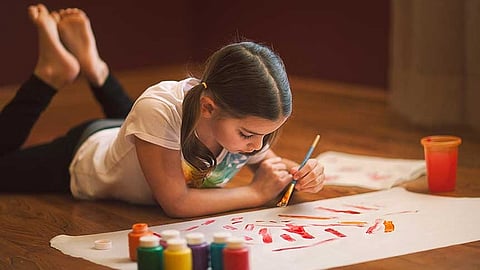

According to new research, teaching creativity to primary school pupils may boost their resistance to issues in real life. In a short study, researchers taught third, fourth, and fifth graders how to employ literary devices like viewpoint shifting, hypothetical (what if) reasoning, and causal (why) thinking to increase their creativity when solving problems.
As per Angus Fletcher, the study's principal author and an English professor at The Ohio State University who is also a part of the university's Project Narrative, the methods helped youngsters come up with fresh, imaginative, and useful solutions to challenges.
“There are concerns about the resiliency of American children in the wake of COVID-19 and this sense that many kids are having a hard time in school and in life,” Fletcher said.
“Creativity training can help kids come up with a second plan when things aren’t working out for them.” The study was published recently in the Journal of Creativity.
Fletcher said the program used to help kids in this study was similar to one he and his colleagues used successfully with the US Army – and which resulted in Fletcher receiving the Public Service Commendation Medal, the fourth-highest public service decoration that the Army can bestow upon a civilian.
The researchers did two separate studies involving students attending a summer camp in a Columbus suburb.
In one study, 32 students were split into two groups. In the control condition, the children were told to identify a special quality about themselves. They were told this was a special power that could help them solve any problem.
In the creative condition, the students were told to think of a friend who did something special and think of them as their “creative friend” who could help them solve any problem. This type of creativity training is called perspective-shifting, in which the kids look at a problem through the eyes of someone else.
“When you ask people to shift their perspective and imagine receiving advice from a friend, you get a lot more creative and effective solutions to problems than just trying to solve the problem yourself,” Fletcher said.
And that’s what the study found. In one part of the study, teachers identified a problem that was challenging for their students – for example, not being able to go to a friend’s birthday party because you’re going to be out of town with your parents.
Students also thought about a challenging problem in their own lives. Some problems that were mentioned included “my brother has a communication disorder,” “my dad has to be away for two months” and “my sister bullies me.”
Results showed that without the perspective-shift training, fewer than half of the students were able to provide a solution to the age-typical problems and almost none were able to provide a solution to their own problems.
But 94 per cent of those who were trained in perspective-shifting provided a solution to both.
A second longitudinal study involving 28 students in the same camp was designed to test the effects of a five-day, 10-hour narrative creativity curriculum on creativity, self-efficacy and resilience.
In addition to perspective-shifting, the students were also trained in other narrative creativity techniques, such as causal thinking, Fletcher said.
MORE LIKE THIS…
“If children can’t solve a problem, we train them to back up and think about what they are trying to accomplish – the why problem,” Fletcher said.
“Step back and say why does this matter? We often find that if you think more broadly about what you are trying to accomplish, and why it is so important, then you can see there are other ways of getting what you want.”
At the end of the curriculum, the students were presented with age-typical problems similar to the first study and also examined one of their own problems.
In order to test resilience, the researchers provided an unexpected challenge when the children presented their proposed solution to their problems: they told the kids it wouldn’t work.
MORE LIKE THIS…
Results showed that every student who took the five-day curriculum was able to provide a second solution to both the age-typical and personal problems.
(ANI)